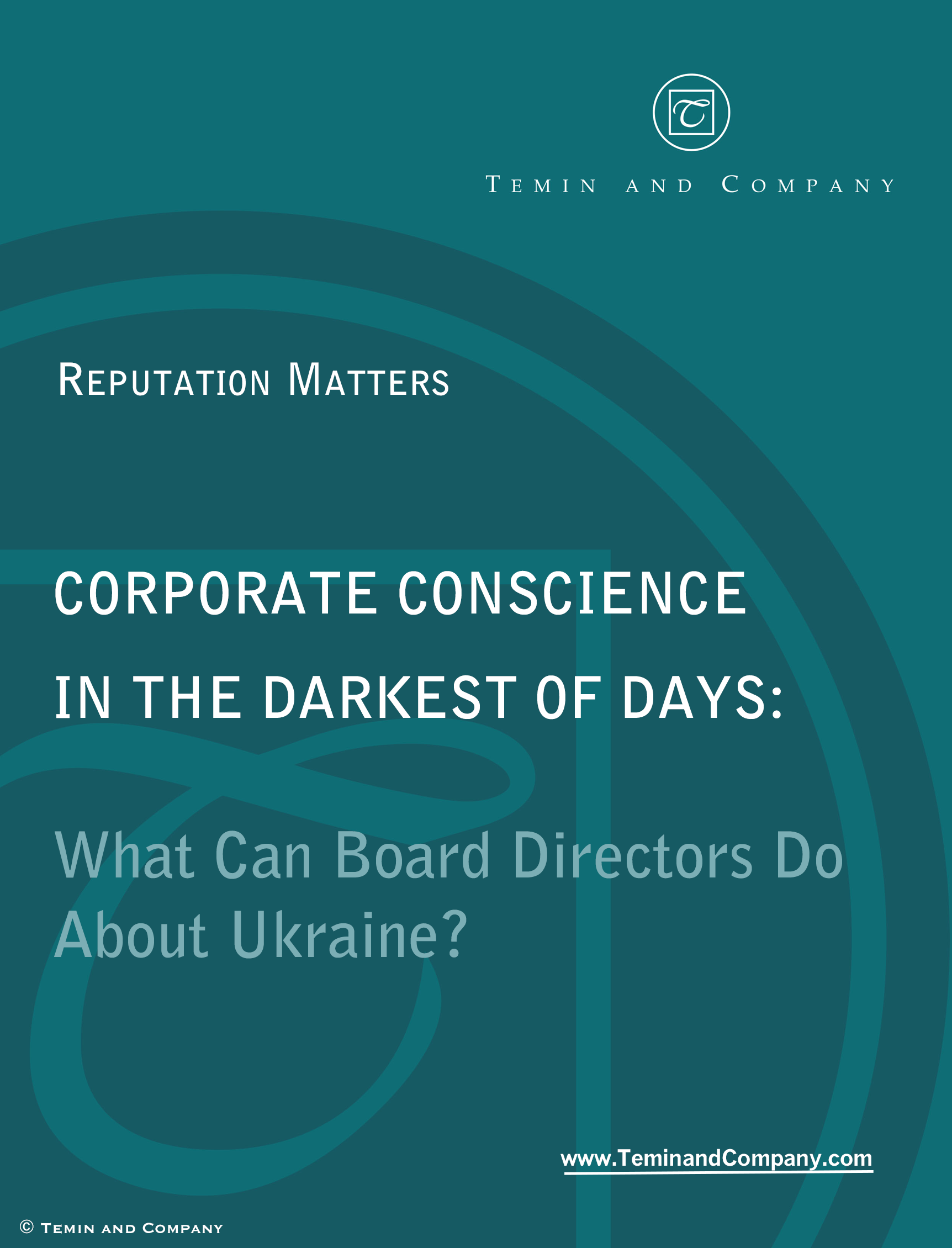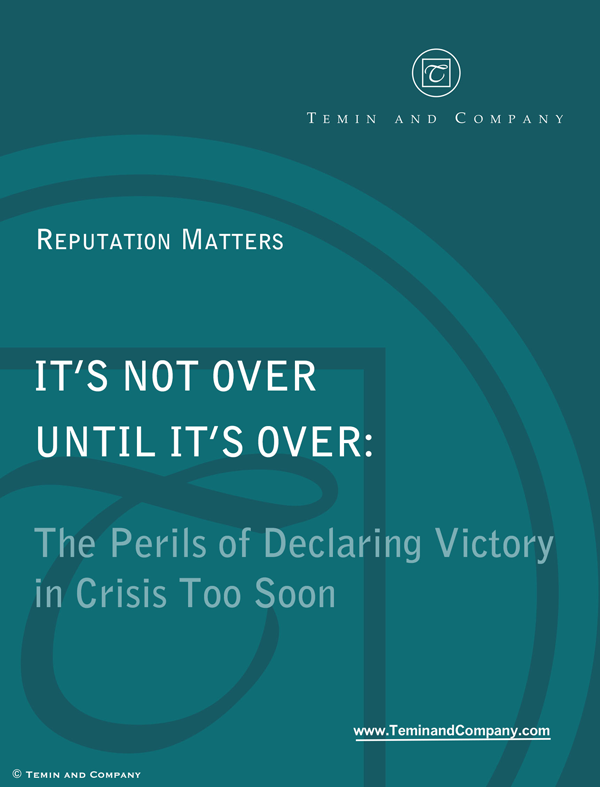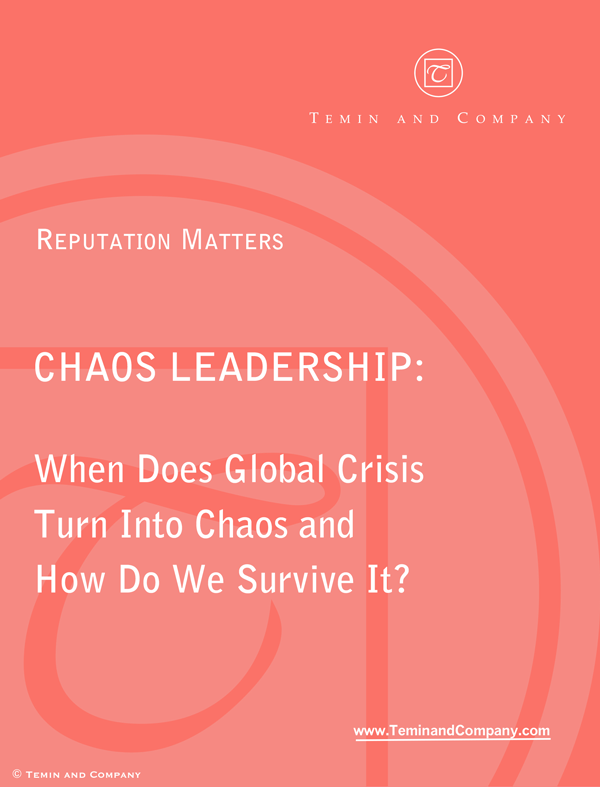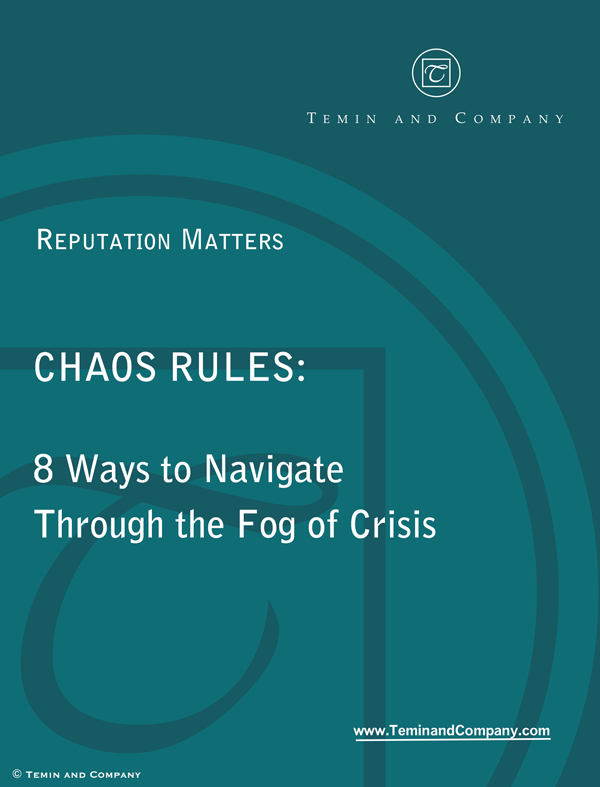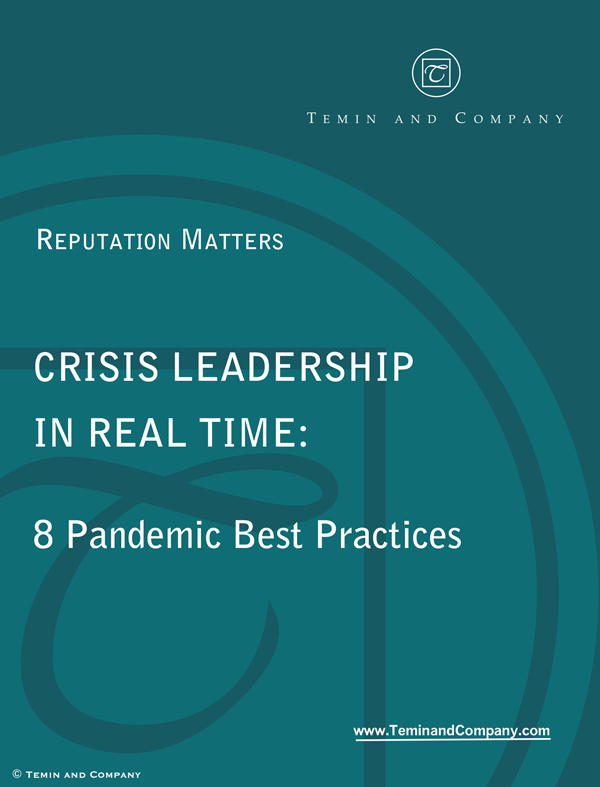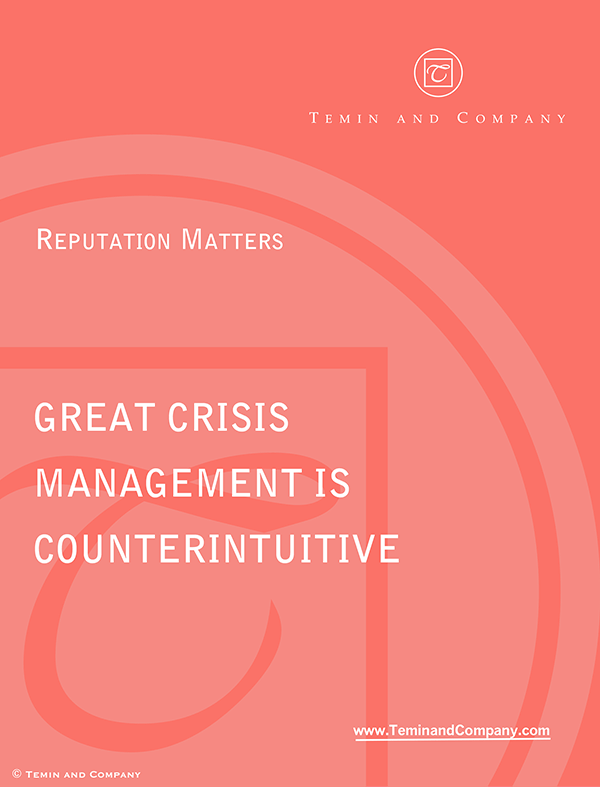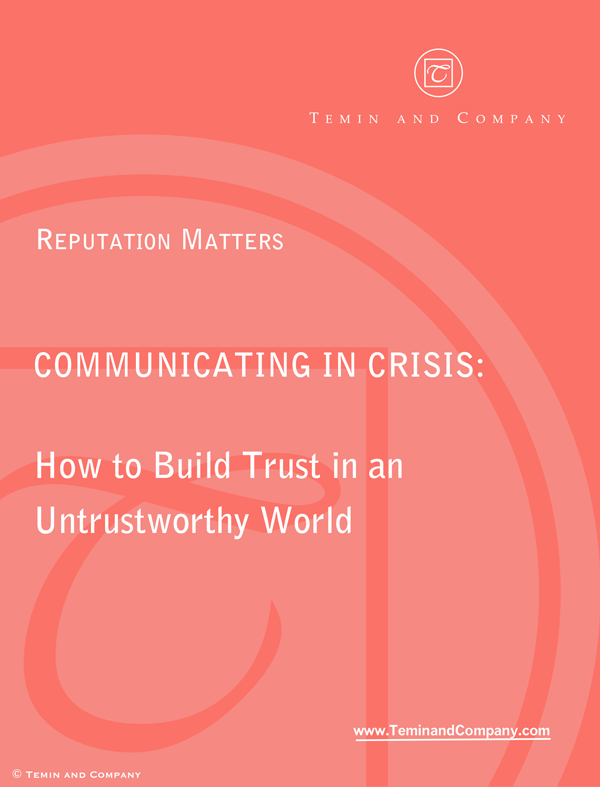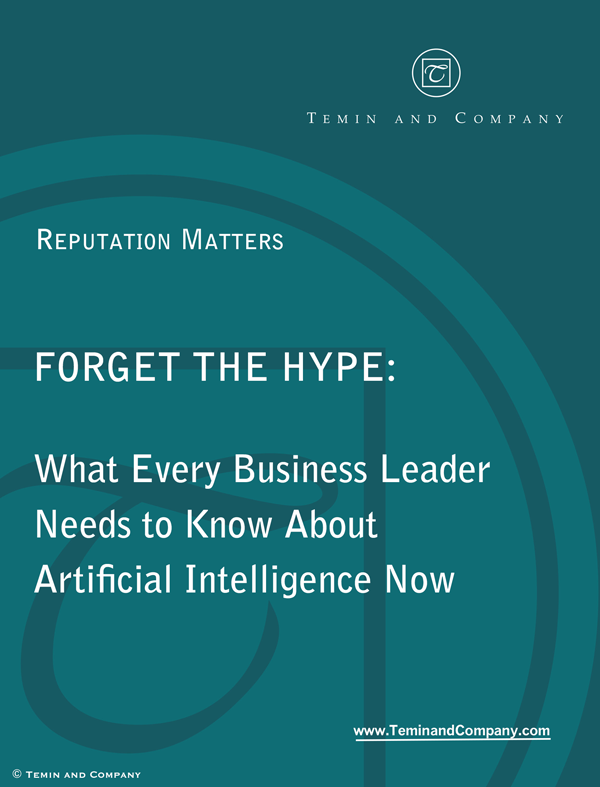Thought Leadership
White Papers»
"Reputation Matters" White Papers seek to offer deeper insight on a wide range of topics we help clients address.
Specialists in marketing through ideas, information, and insight, Temin and Company turns clients’ intellectual capital into true thought leadership.
We also seek to practice what we preach.
Temin and Company’s own thought leadership includes white papers, yearly client letters and podcasts, published articles, a Forbes.com column – Reputation Matters, Huffington Post and American Banker articles, and appearances in other news articles and broadcasts.
Further, Davia Temin is a frequent public speaker and moderator – for clients, their own client events, and their “high potential” training programs. She also presents regularly at CEO conferences, and has developed a range of “Crisis Game” role play simulations to prepare CEOs, Boards, and client companies for real-life crisis situations.
What Would Bezos Do?
Davia Temin, Directors & Boards, February 11, 2019
Lessons for boards on how unexpected boldness sometimes wins the day
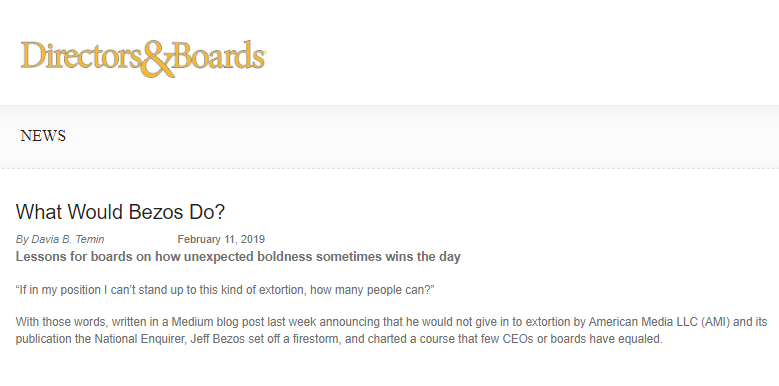
“If in my position I can’t stand up to this kind of extortion, how many people can?”
With those words, written in a Medium blog post last week announcing that he would not give in to extortion by American Media LLC (AMI) and its publication the National Enquirer, Jeff Bezos set off a firestorm, and charted a course that few CEOs or boards have equaled.
What the founder of Amazon, and the richest man in the world, did was show us how the head of a public company could put it all on the line to stand up to bullies. “Courage comes first,” he essentially told us, no matter what the personal or professional cost.
And apparently his prestigious board agreed. […read more]
Jeff Bezos Shows Us A Thing Or Two – 6 Ways To Face Down Crisis With Courage
Leadership, “Reputation Matters,” Forbes, February 8, 2019
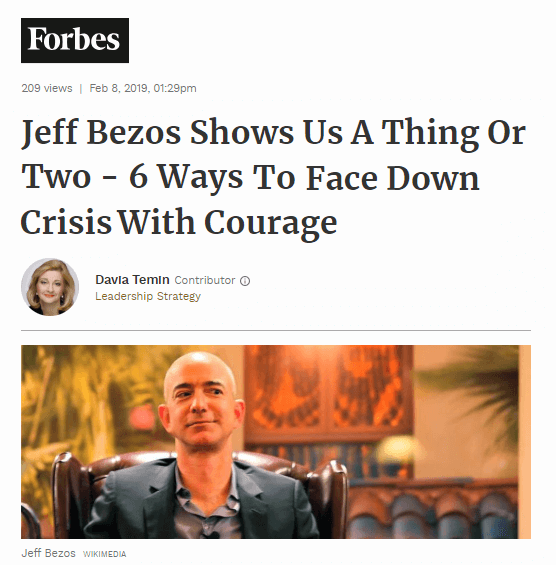
Phoenix-like, Jeff Bezos has risen from the ashes of bad decisions to make a great one. He is showing us — individuals, CEOs, Board Members, and other leaders — how to stand up to bullying and extortion — when he has everything to lose by doing it.
Perhaps it takes the richest man in the country, or someone who has been accused of bullying himself, to have the self confidence to put it all on the line. But he is modeling a bold kind of leadership we haven’t seen for a while.
Boards choose and keep CEOs not just for the insight, oversight and strategy they provide in business as usual – but how they lead through the firestorm.
And every organization has firestorms.
But not every CEO has the self-assurance, courage and backing to do the really, really tough — but right — thing when it all goes south. […read more]
When the CEO Has To Go
Davia Temin, Directors & Boards, Fourth Quarter 2018
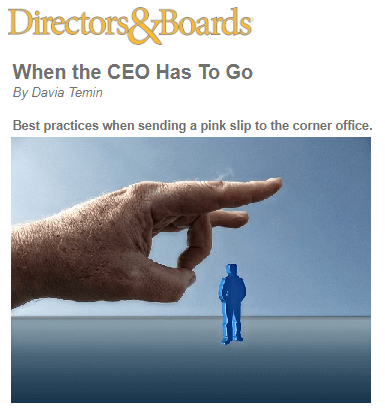
With the explosion of the #MeToo Movement, CEOs – like other executives – are being accused of sexual harassment or inappropriate behavior more than ever before. And after an investigation, if found guilty, more are being shown the door.
Our Temin “#MeToo Index,” which has cataloged all of the serious allegations since December, 2015 (when Bill Cosby was first arrested), has logged accusations against 32 public company CEOs or presidents, and 18 nonprofit CEOs or presidents to date. Approximately 89% of those accused have either resigned or retired, or were fired or suspended. Approximately 30% were fired outright.
But one of the most challenging tasks for any board is firing its CEO. […read more]
The Right Way To Handle A CEO Scandal
Davia Temin, Corporate Board Member, 2018
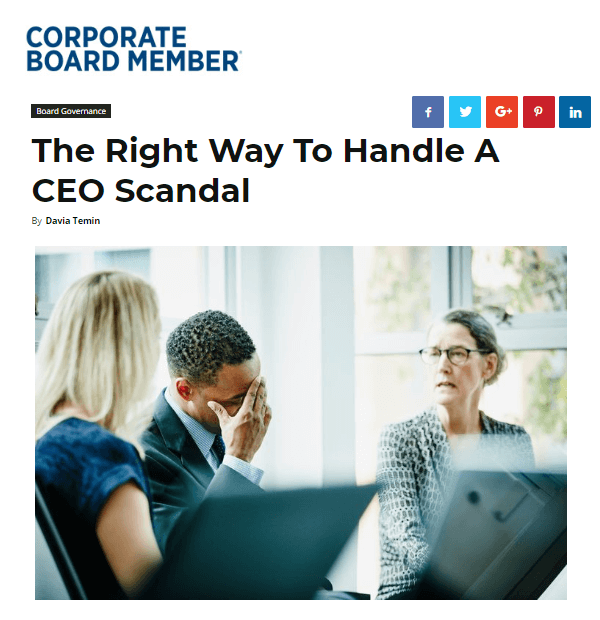
It used to be that a founding CEO could be excused all manner of misbehavior by his or her board, as long as it was kept quiet and the bottom line was not negatively impacted. In my 20 years as founder and CEO of a boutique crisis management firm, I have dealt with well over 60 cases of CEO dismissal, and an equal number of case where the CEO did not get dismissed. It used to be that the board might either tolerate bad behavior, or publicly support a CEO while privately chastising him relentlessly. Regardless, he or she would stay.
More recently, however, given the outsized attention to serious CEO misbehavior, boards really have little choice—they must react, and act, quickly and decisively. In the brave new world of 24-hour news cycles and social media commentary that transits the globe at the speed of light, no CEO is invulnerable or—once found to be guilty of ethical violations—irreplaceable. […read more]
The Facebook Mess: The Difference Between Commissioning And Acting On Opposition Research
Leadership, “Reputation Matters,” Forbes, November 30, 2018
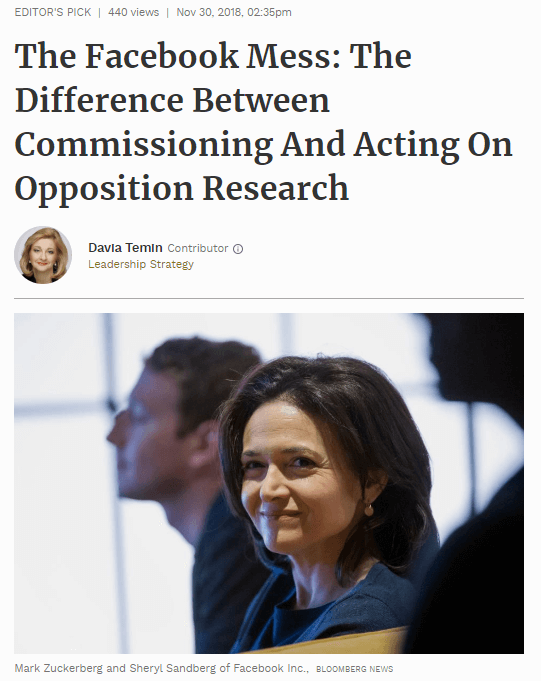 Not everything that Facebook has done lately is wrong. So, let’s try to sort out the prudent from the feckless before we all jump on the “kill Facebook” bandwagon. Due Diligence vs. Opposition (Oppo) Research Organizations commission in-depth research on their competitors and perceived adversaries all the time: it’s called due diligence. In fact, it could be argued that a company or non-profit is not doing their job if they don’t seek to understand deeply those who invest in them, comment on them, compliment them, and criticize them. That is simply looking for more information, motives, ulterior motives, and doing the proper due diligence that their stockholders and stakeholders would expect them to do. Good strategy would dictate that they can not be expected to fly blind in a firestorm, if they can help it. On this level, there is absolutely nothing wrong — in my opinion as someone who has been active in creating public strategies for private and public organizations for a long time — with Facebook’s commissioning “oppo” research into George Soros after he excoriated tech companies at Davos. You know what: every good professional would, or should have, done the same thing. […read more]
Not everything that Facebook has done lately is wrong. So, let’s try to sort out the prudent from the feckless before we all jump on the “kill Facebook” bandwagon. Due Diligence vs. Opposition (Oppo) Research Organizations commission in-depth research on their competitors and perceived adversaries all the time: it’s called due diligence. In fact, it could be argued that a company or non-profit is not doing their job if they don’t seek to understand deeply those who invest in them, comment on them, compliment them, and criticize them. That is simply looking for more information, motives, ulterior motives, and doing the proper due diligence that their stockholders and stakeholders would expect them to do. Good strategy would dictate that they can not be expected to fly blind in a firestorm, if they can help it. On this level, there is absolutely nothing wrong — in my opinion as someone who has been active in creating public strategies for private and public organizations for a long time — with Facebook’s commissioning “oppo” research into George Soros after he excoriated tech companies at Davos. You know what: every good professional would, or should have, done the same thing. […read more]
When Masters Of The Universe Fall – How Facebook Committed The 7 Deadly Sins Of Crisis Management
Leadership, “Reputation Matters,” Forbes, November 16, 2018
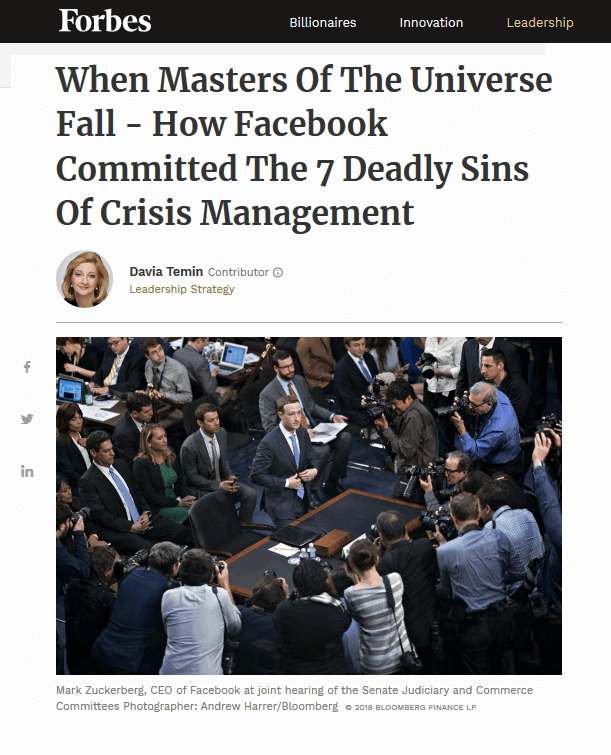
Wall Street’s Investment Bankers used to be called the Masters of the Universe, but that seems so last millennium now. As the mantle of unbridled self-confidence and ego has moved westward, many new “Tech Masters” have surpassed their predecessors in over-confidence, over-estimation of how powerful they are, and in how badly they can get things wrong. Crisis, of course, ensues.
Facebook showcases the whole issue. Every industry and every generation feels invulnerable as long as everything is going their way. And the behemoth that Mark Zuckerberg built has led the pack. But when a fall from grace comes, as it has come for Facebook (through their own mistakes says yesterday’s blockbuster New York Times article Delay, Deny, Deflect: How Facebook Leaders Leaned Out in Crisis), it shakes the world. At least the cyber world, and all who live or visit there.
Crisis demands the ability to see clearly, the humility to admit mistakes readily, and the courage to do whatever it takes to fix those mistakes immediately. If you can’t do this, you are committing one or more of the 7 deadly cardinal sins of crisis management. Facebook, it turns out, has committed all 7. […read more]
How Should Men Accused of #MeToo Offenses Respond?
Leadership, “Reputation Matters,” Forbes, September 14, 2018
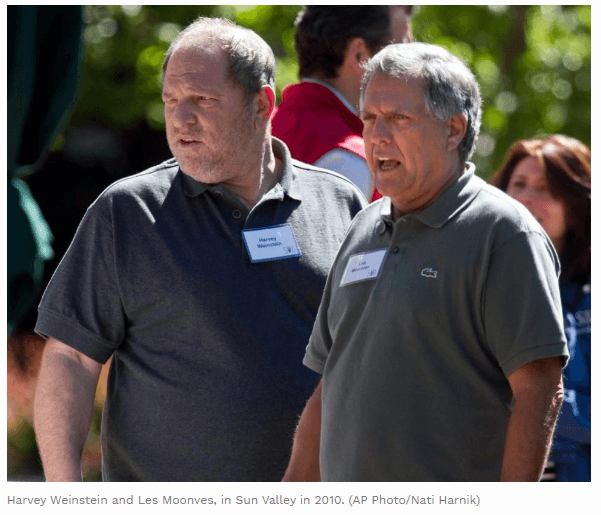
What would have happened last year if—upon hearing of Harvey Weinstein’s sexual harassment debacle and forced exit from the company he created—CBS CEO Les Moonves had decided to take a radically different path?
What if—knowing that a police report was being filed against him, and that news of it and other abuses he had never admitted to was inevitably going to come out in the current environment—he had chosen to come clean instead of continuing to stonewall? In fact, what would have happened if he had come clean long before?
While this is not the crisis advice one would necessarily give, as the #MeToo movement marches on we need to find some new strategies not only for curtailing abusive behavior, confronting it and making reparation but also for potentially modeling how one might recover honorably. […read more]
Les Moonves Makes No. 700 On The #MeToo Index (And Jeff Fager Is 701)
Leadership, “Reputation Matters,” Forbes, September 12, 2018
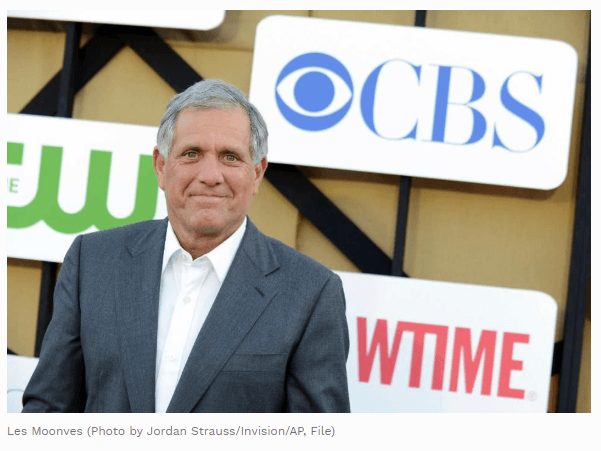
Just in case any of us thought that the #MeToo phenomenon was a flash in the pan, the ouster of CBS CEO Les Moonves and 60 Minutes Executive Producer Jeff Faber, the latest high-profile public figures to be felled as the movement continues, has proven otherwise. As our tally of public figures accused of sexual harassment, or other #MeToo violations, continues to climb, the mighty and the mousy, the sacred and the profane are being called to account. The numbers tell us that the movement has both momentum and staying power.
Les Moonves makes 700, and Jeff Fager 701. […read more]
BankThink How to save a bank’s reputation
Davia Temin, American Banker, June 28, 2018
![]()
From #MeToo to lending to gunmakers, from compliance issues to cyberhacks, from questionable marketing practices to persistent gender inequality — political, economic, and social issues are all directly impacting bank operations and reputations like never before.
Moreover, the rules appear to be changing in real time. Where the “Boom Boom Room” was an aberration that took a long time to be taken seriously and then addressed, today almost any whiff of sexual harassment will find bankers on the curb in a nanosecond, as the public’s tolerance for such behavior is plummeting.
Yet new studies are telling us that even after a crisis of major proportions, most companies’ share price returns to normal valuation in months. (Note how quickly Equifax rebounded after its massive hack.)
So, what is the difference between a reputational hit that ends up being just a blip, and one that becomes an extinction level event? Following are five ways to assess your exposure. […read more]
How The Reputation Risk Of #MeToo Is Forcing Businesses To Reevaluate Their Corporate Culture
Leadership, “Reputation Matters,” Forbes, May 14, 2018
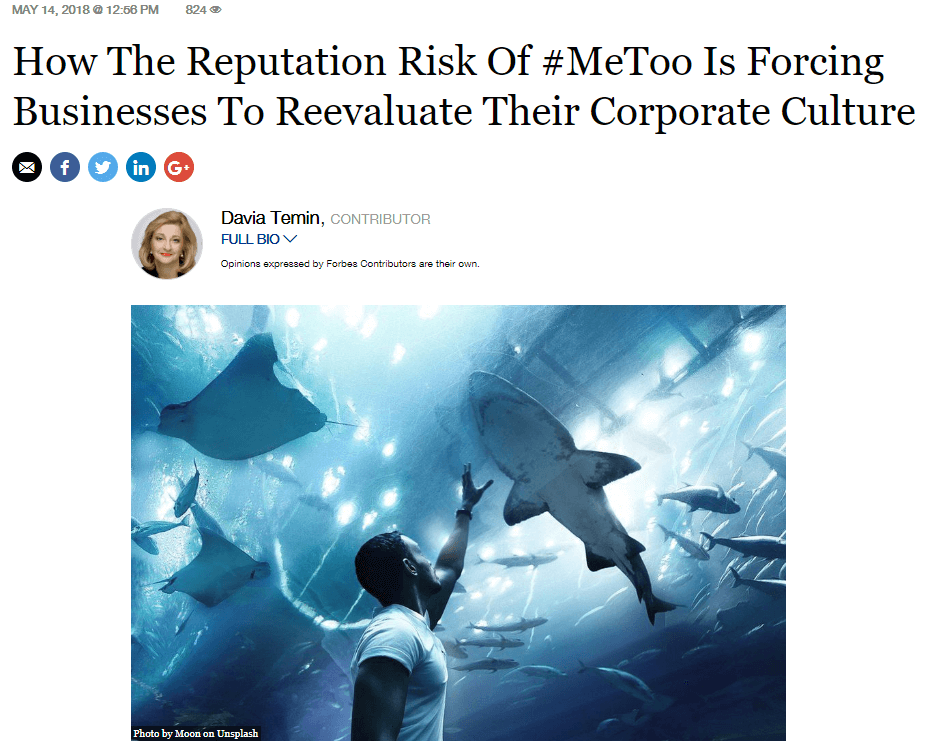
Real #MeToo incidents in the workplace aren’t happening in a vacuum. Whether they are the most egregious examples of sexual harassment and abuse, or more subtle acts of unconscious bias, they all happen within a culture that somehow sanctions them.
New Examination of Corporate Culture
That is why the reputational risks of #MeToo (we calculate that since the first Bill Cosby trial, 298 high-profile executives have been let go in the US because of sexual improprieties), as well as escalating global calls for gender equity, are sparking a whole new examination of corporate and organizational culture. What elements of culture enable abuse, or create a toxic work environment, and what elements preclude them? […read more]
White Papers»
"Reputation Matters" White Papers seek to offer deeper insight on a wide range of topics we help clients address.




